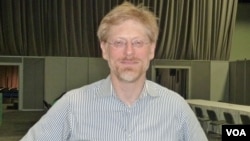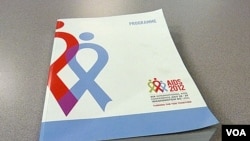The 19th international AIDS Conference produced a flood of reports, recommendations and warnings about the epidemic. The head of a leading AIDS advocacy group questions whether such meetings are getting too big and too complex.
AVAC Executive Director Mitchell Warren says on a scale from one to 10, he gives AIDS 2012 a score of five. He gives the conference high marks for political commitment, vision and rhetoric, but low scores for science and – what he called – the “nuts and bolts” of what comes next.
“The conference is too big, too long. So you have all of this noise and the challenge is [in] the next week or two how do we cut through that noise and figure out, for me the single most important question, now what?”
The conference program is the size of a phone book, listing many sessions from early morning to evening. Warren says the program reflects the complexity of the epidemic.
“This is certainly a scientific meeting to a small degree. It’s a policy to a small degree. It’s a community forum to a very large degree. I’m that’s good. It’s exciting that we see all of these different elements come together. Sifting through it is hard. One of the good parts of the conference is actually what happens outside of the conference room. You can get the power point presentations or see the slides on line or watch the webcast. I think the best part of the conference is to connect with the partners on the ground, who are doing the work,” he said.
He said many terms are “bandied about” at the conference, such as “ending AIDS,” “ending the epidemic,’ and an “AIDS-free generation.” He said they all have slightly different meanings.
“They’re all very aspirational goals. I’m excited about the aspirational goals. I think they give us a direction. They give us a target, but nothing about this is simple. I think what this meeting tells me is that we’re not here to celebrate success because we have not been successful in our AIDS response. We’re here, though, celebrating the opportunity that we might succeed,” he said.
But he said to do that, very specific targets must be set and resources must be used very efficiently. Warren supports a combination approach to HIV/AIDS.
“If we only dealt with stigma and discrimination, we would make enormous progress. We wouldn’t end the epidemic though. If we only dealt with Treatment as Prevention, we would make progress, but we wouldn’t end the epidemic. If we had a vaccine, we would make great progress, but we wouldn’t end the epidemic. The best AIDS response is the one that puts all of the pieces together,” he said.
He added that all those battling the epidemic, whether on the science or social level, must base their efforts on evidence. Only then, Warren says, will the next step be reached.
AIDS 2014 will be held Melbourne, Australia.
AVAC Executive Director Mitchell Warren says on a scale from one to 10, he gives AIDS 2012 a score of five. He gives the conference high marks for political commitment, vision and rhetoric, but low scores for science and – what he called – the “nuts and bolts” of what comes next.
“The conference is too big, too long. So you have all of this noise and the challenge is [in] the next week or two how do we cut through that noise and figure out, for me the single most important question, now what?”
The conference program is the size of a phone book, listing many sessions from early morning to evening. Warren says the program reflects the complexity of the epidemic.
“This is certainly a scientific meeting to a small degree. It’s a policy to a small degree. It’s a community forum to a very large degree. I’m that’s good. It’s exciting that we see all of these different elements come together. Sifting through it is hard. One of the good parts of the conference is actually what happens outside of the conference room. You can get the power point presentations or see the slides on line or watch the webcast. I think the best part of the conference is to connect with the partners on the ground, who are doing the work,” he said.
He said many terms are “bandied about” at the conference, such as “ending AIDS,” “ending the epidemic,’ and an “AIDS-free generation.” He said they all have slightly different meanings.
“They’re all very aspirational goals. I’m excited about the aspirational goals. I think they give us a direction. They give us a target, but nothing about this is simple. I think what this meeting tells me is that we’re not here to celebrate success because we have not been successful in our AIDS response. We’re here, though, celebrating the opportunity that we might succeed,” he said.
But he said to do that, very specific targets must be set and resources must be used very efficiently. Warren supports a combination approach to HIV/AIDS.
“If we only dealt with stigma and discrimination, we would make enormous progress. We wouldn’t end the epidemic though. If we only dealt with Treatment as Prevention, we would make progress, but we wouldn’t end the epidemic. If we had a vaccine, we would make great progress, but we wouldn’t end the epidemic. The best AIDS response is the one that puts all of the pieces together,” he said.
He added that all those battling the epidemic, whether on the science or social level, must base their efforts on evidence. Only then, Warren says, will the next step be reached.
AIDS 2014 will be held Melbourne, Australia.















